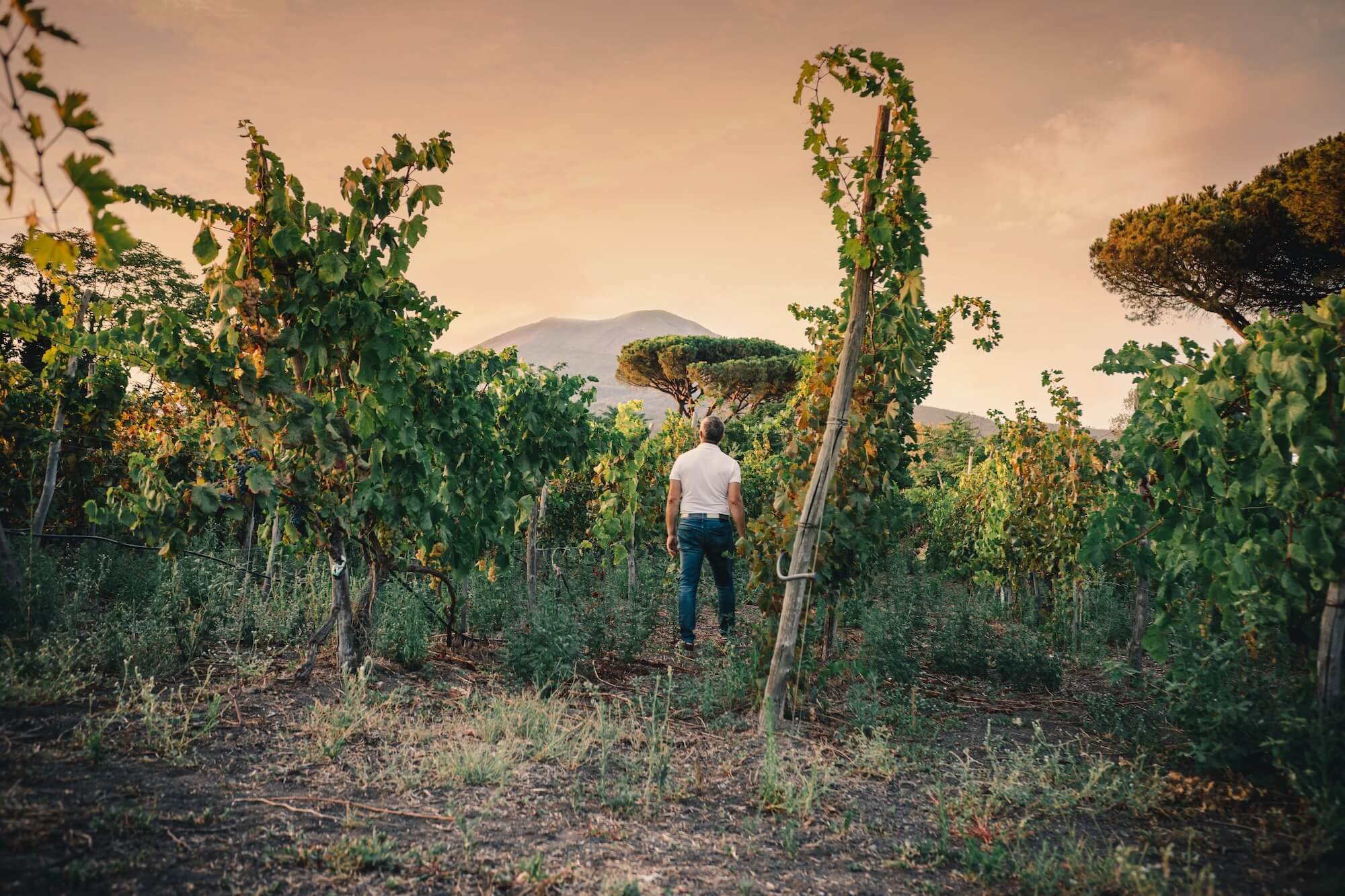Volcanic Heritage in a Bottle: The Wines of Casa Setaro
Massimo Setaro in the vineyards
Unique and rich soils made of extrusive rocks and black sand echoing the past furious impetus of the volcano, fostering remarkable biodiversity; the fresh sea breeze coming from the sea within sight; the ungrafted vineyards passed down from generation to generation; a wealth of family knowledge and passion, and a modern entrepreneurial approach which does not betray the ancient heritage. These are the key elements that make Casa Setaro's some of the most interesting wines produced on the slope of Vesuvius, the iconic twin-shaped mountain profile (with the cone dubbed by the remains of a collapsed second one) overlooking Naples.
In 2004, Massimo Setaro, who inherited the land from his father Vincenzo, officially established Casa Setaro winery near the small Trecase village, collecting the legacy of three generations who had been growing vines on this generous yet challenging land.
Today, he and his wife Mariarosaria take care of about 44 acres on the volcano slopes, located at an altitude between 200 and 350 meters above sea level, matching the consideration for century-old traditions – starting with the method of layering to propagate vines from the parent plant – with a strong respect of the environment and an eye on innovation.
Volcanic soil at Casa Sentaro
Sustainability and native grapes
Set within Vesuvius National Park, Casa Setaro's overall vineyard embraces different parcels, each made of peculiar soil, microclimate, and exposure and more suited to one variety than another. With no use of herbicides and chemical fertilizers, working hard in the vineyard to naturally obtain healthy and ripe grapes and in the cellar to make genuine, great wines, Massimo and Mariarosaria focus on the native grapes of this land, including the lesser-known ones such as Piedirosso and the almost disappeared Caprettone, whose name in Italian is a hint to the goat's beard shaped bunches. This rare white grape has only recently been recognized as a vine with its own specific profile, typical of the Neapolitan volcanic area.
Excellent wines with a strong personality
Ripe grapes at Casa Setaro
As for any other of his wines, including the most established PDO such as the Don Vincenzo Red Lacryma Christi del Vesuvio Doc, entitled to his father and also coming in the elegant Riserva version,Setaro forged its own interpretations. This is how the elegant and refreshing Pietrafumante Brut sparkling wine – recently launched even in the rosé version from Piedirosso grapes – was born: aging in a bottle for 30 months on the lees; it pairs great structure with a lasting mineral profile. Aryete is one of the still versions of Caprettone: fermented and matured in amphora and barrel, with a final 2-month bottle aging, it's complex and long-lasting, with balsamic aromas. Munazei is the white Lacryma Christi Del Vesuvio Doc, rich with flowers, citrus notes, and a savory finish. Piedirosso grapes shape the Munazei Rosso, red Lacryma Christi Del Vesuvio Doc: refined in steel vats for 6 months and resting 3 more months in the bottle, it's elegant and balanced, with scents of violets and wildflowers, and spices, black pepper and flint on the palate. The refinement in amphorae and large French oak barrels enhances the notes of tobacco, spices, and volcanic soil in the round, balanced, and long Fuocoallegro Vesuvio Piedirosso Doc. Yet more labels compose Casa Setaro’s range, including interesting bottlings from the well-known regional Falanghina and Aglianico grapes.
Wine experiences and hospitality in the shadow of the volcano
Vacryma Christi Del Vesuvio Doc Rosso Munazei
Casa Setaro offers several interesting wine experiences, all starting with a walk along the vineyards to get to know the different local grapes and a visit to the cellar to understand the wine-making and aging processes. And, of course, all end with a tasting of the wines, choosing amongst the various expressions of red, white, and rosé Lacryma Christi del Vesuvio Doc, on single varieties or a broad glimpse of the winery productions. Since summer 2024, the new hospitality facility Vigna delle Rose, the first ever “albergo diffuso” (literally, scattered hotel, meaning accommodations spread in several lodgings in the area) on the Vesuvius with a panoramic dining room, has been welcoming guests for special dinner and lunches or tastings, private events and relaxing stays, offering a wonderful view over the gulf and the Penisola Sorrentina, and a nice summer pool. Still, if one is not lucky enough to go – or go back – on the Vesuvius slopes, sipping one of their wines will bring some volcanic energy to the table.




